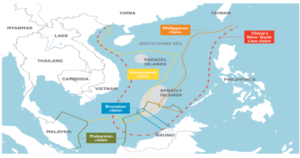Since 2002, the CPC Politburo has been convening monthly group study sessions conducted by professors and researchers. Speakers lecture on domestic affairs and share experiences from developed countries. Priority is given to economic issues, followed by political / ideological and social issues, and lastly, military issues and international relations.
In his recent speech at the 30th collective study session of the politburo, Xi instructed the country’s leaders to focus on a “trustworthy, lovable and respectable” image for China. He went on to suggest that the country should adopt a “humble” approach in relations with the outside world (“We should make friends, unite and win the majority, and continuously expand the circle of international public opinion friends who know China and are friendly to China”). Most of Xi’s remarks focused on redoubling Beijing’s efforts to create a more positive image of the Communist Party overseas by using social media, electronic media and other means.
There were swift reactions worldwide to the statement. Some wondered whether it was the end of China’s sharp-edged Wolf Warrior diplomacy. Others were cautious and hopeful that it could lead to real change. Essence of some of the reactions from various China watchers are as follows:
- What Xi says cannot and should not be trusted. His regime is committing genocide and violating human rights, skirting responsibility for the global pandemic that killed thousands around the world, and building a military and threatening the world.
- Xi’s comments don’t really change anything. It is just a change in approach, unless the words are put to action.
- Maybe the change in tone is to avoid boycott of Olympics. The call for boycott of Olympics in China are increasing world over.
- Xi’s speech is a slight turn and not a fundamental reorientation because the emphasis is still on promoting a positive image of China overseas. The news release of the event indicates that the speech meant to convey that “China should assert its views but do so in a more artful manner. Do not have to go all-out like a Wolf Warrior all of the time and can take a step back sometimes.”
- One of the view is that Xi is serious about the change in approach, and he has urged everyone to “develop a voice in international discourse that matches with China’s comprehensive national strength and international status, presenting a true, multi-dimensional and panoramic view of the country.”
- The reactions in US are divided with one school of thought suggesting that the China policy of US should not change, while the other suggesting that US should also tone down.
My Take
- China cannot be trusted.
- China is known for deceit and betrayal, changing its stance frequently.
- This is just a change in approach and not its policies.
- The change in tone is because of realisation that it has made too many enemies.
- The change is to avoid damage to its economic growth (in turn growth in military power).
- The change is in tune with its policy of two steps forward and one back.
- The aggressive approach and belligerent behaviour would return again once it attains more power.
Titbits
Term Wolf Warrior diplomacy was inspired by China’s popular Rambo-like movies, “Wolf Warrior” and “Wolf Warrior II.” The label has come to signify the tough, sharp-edged tone of many Chinese diplomats.
Value additions and comments are most welcome.
For regular updates please register here –
https://55nda.com/blogs/anil-khosla/subscribe/
References:
- https://www.politico.com/newsletters/politico-china-watcher/2021/06/03/xi-defangs-the-wolf-warrior-493098?nname=politico-china-watcher&nid=00000172-18aa-d57a-ad7b-5eafdd2b0000&nrid=3c46f8a6-d8dc-4af2-9727-6a8433d3e038&nlid=2674343
- https://www.nottingham.ac.uk/iaps/documents/cpi/briefings/briefing-27-collective-study-sessions-of-the-politburo.pdf
- http://en.people.cn/n3/2016/0204/c98649-9014098.html
- 4. https://www.politico.com/newsletters/politico-china-watcher/2021/06/03/xi-defangs-the-wolf-warrior-493098

